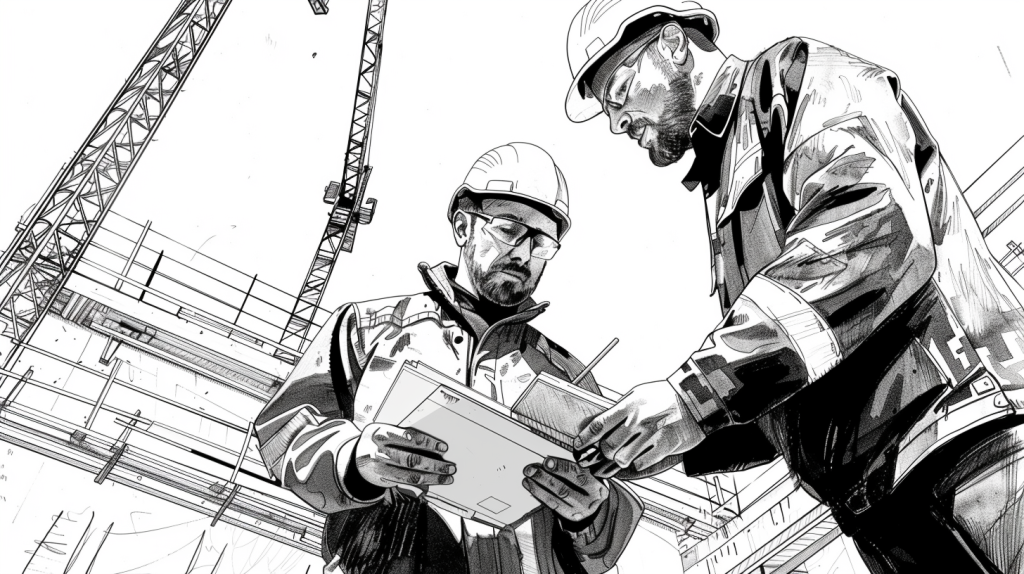The Ultimate Guide to Effective Time Tracking in Construction: Strategies, Tools, and Real-World Applications
Table of Contents:

Dive into the ultimate guide to effective time tracking in construction. Discover key strategies, tools, and real-world applications that project managers can use to monitor time, boost productivity, and achieve successful project outcomes.
In the construction industry, time is one of the most critical resources. Efficient time tracking ensures that projects stay on schedule, labor costs are controlled, and productivity is maximized. Mastering time tracking is essential for project managers who aim to deliver successful projects consistently.
This comprehensive guide explores the best strategies, essential tools, and real-world applications of time tracking in construction. Whether you’re managing a small team or overseeing large-scale projects, these insights will help you implement effective time tracking practices that enhance efficiency and drive better project outcomes.
The Importance of Time Tracking in Construction
Boosting Productivity
Effective time tracking is crucial for boosting productivity in construction projects. By accurately monitoring labor hours, project managers can identify inefficiencies, optimize resource allocation, and ensure that tasks are completed on time.
For example, detailed time tracking can reveal patterns of unproductive work periods, allowing managers to address these issues promptly. This proactive approach helps maintain high productivity levels throughout the project.
Controlling Labor Costs
Labor costs represent a significant portion of any construction project budget. Accurate time tracking helps control these costs by ensuring that labor hours are recorded correctly and that workers are paid for the actual time worked.
For instance, using time tracking software can automate the process of recording labor hours, reducing the risk of errors and discrepancies. This accuracy helps prevent budget overruns and financial discrepancies.
Ensuring Project Timeliness
Time tracking plays a vital role in ensuring that construction projects stay on schedule. By keeping track of labor hours and task completion times, project managers can monitor progress and make adjustments as needed to meet deadlines.
For example, real-time time tracking allows managers to see if the project is on track and identify any potential delays early. This visibility enables timely interventions, helping to keep the project on schedule and avoid costly delays.
Related Articles:
Key Strategies for Effective Time Tracking

StruxHub: Revolutionizing Project Management in Large Commercial Construction
Implementing Time Tracking Tools
Enhancing Accuracy and Efficiency
Implementing dedicated time tracking tools can significantly enhance the accuracy and efficiency of time tracking in construction. These tools offer features such as automated time recording, real-time monitoring, and detailed reporting, ensuring that all labor hours are tracked systematically.
For example, time tracking software can automatically record labor hours based on employee clock-ins and clock-outs, reducing the need for manual timekeeping. This automation ensures that time tracking is accurate and consistent, providing reliable data for project management.
Developing Clear Time Tracking Policies
Establishing Procedures and Responsibilities
Developing clear time tracking policies is essential for ensuring that all team members understand the procedures and responsibilities associated with time tracking. These policies should outline how time should be recorded, who is responsible for timekeeping, and how time tracking data will be used.
For example, a time tracking policy might specify that employees must clock in and out using a designated time tracking system and that supervisors are responsible for reviewing and approving time records. By establishing clear procedures, construction managers can ensure that time tracking is consistent and reliable.
Conducting Regular Time Audits
Ensuring Accuracy and Compliance
Regular time audits are crucial for ensuring the accuracy and compliance of time tracking data. These audits involve reviewing time records to identify any discrepancies, inaccuracies, or non-compliance with time tracking policies.
For instance, conducting monthly time audits can help project managers identify patterns of timekeeping errors or potential time theft. By addressing these issues promptly, managers can maintain the integrity of time tracking data and ensure that labor hours are accurately recorded.
Encouraging Employee Participation
Fostering a Culture of Accountability
Encouraging employee participation in time tracking is essential for fostering a culture of accountability and ensuring that time tracking data is accurate. This involves educating employees about the importance of time tracking and how it benefits the project and the company.
For example, holding training sessions to explain the time tracking process and its significance can help employees understand their role in maintaining accurate time records. By fostering a culture of accountability, construction managers can ensure that all team members take time tracking seriously.
Essential Tools for Time Tracking in Construction

StruxHub
Experience the power of StruxHub today and witness firsthand how it can revolutionize your construction operations.
Time Tracking Software
Streamlining the Process
Time tracking software is a vital tool for streamlining the time tracking process. These platforms offer features such as automated time recording, real-time monitoring, and detailed reporting, ensuring that all labor hours are tracked systematically.
For instance, tools like StruxHub provide comprehensive time tracking solutions that streamline the entire process. These tools enable construction managers to record, monitor, and analyze labor hours efficiently, ensuring that all time tracking data is accurate and accessible.
Mobile Time Tracking Apps
Enhancing Flexibility and Convenience
Mobile time tracking apps provide flexibility and convenience for recording labor hours, especially for construction workers who are often on the move. These apps allow employees to clock in and out using their mobile devices, ensuring accurate and timely recording of labor hours.
For example, using a mobile time tracking app allows workers to record their hours from any location, reducing the need for manual timekeeping and ensuring that time records are up-to-date. This flexibility enhances the accuracy and reliability of time tracking data.
Project Management Software
Integrating Time Tracking with Project Management
Project management software provides a comprehensive solution for managing all aspects of a construction project, including time tracking. These platforms offer features such as task management, document sharing, and real-time communication, enhancing coordination and collaboration among project teams.
For example, integrating time tracking tools with project management software ensures that all labor hours are reflected in the overall project plan. This integration allows construction managers to track the impact of labor hours on the project scope, schedule, and budget, ensuring that all time tracking data is managed consistently.
GPS Time Tracking
Ensuring Accurate Location-Based Timekeeping
GPS time tracking tools provide accurate location-based timekeeping, ensuring that employees are clocking in and out at the correct job sites. This feature is particularly useful for construction projects that involve multiple locations or remote sites.
For instance, using GPS time tracking tools allows construction managers to verify that employees are on-site when they clock in and out. This accuracy helps prevent time theft and ensures that labor hours are recorded correctly.
Real-World Applications of Time Tracking Tools
Enhancing Project Efficiency with StruxHub
StruxHub’s comprehensive time tracking features have been instrumental in enhancing project efficiency for numerous construction projects. By providing real-time monitoring, automated time recording, and detailed reporting, StruxHub enables construction managers to track labor hours accurately and efficiently.
Streamlining Financial Management
Integrating time tracking tools with accounting and financial management software helps streamline financial management and ensure that all labor costs are accurately tracked. For instance, a construction company using StruxHub’s time tracking features can integrate the software with QuickBooks to track labor costs in real-time.
Improving Communication and Collaboration
Collaborative project management software facilitates transparent communication and collaboration among all stakeholders. For example, using StruxHub allows stakeholders to review and approve time records online, ensuring that all labor hours are accurately recorded and managed.
Related Articles
Top 12 Tips for Mastering Time Tracking in Construction

1. Develop Clear Time Tracking Policies
Create clear time tracking policies that define the procedures for recording, reviewing, and approving labor hours. Ensure that these policies are communicated to all stakeholders and enforced consistently.
2. Use Time Tracking Software
Implement dedicated time tracking software to streamline the time tracking process. Tools like StruxHub offer features such as automated time recording, real-time monitoring, and detailed reporting.
3. Conduct Regular Time Audits
Review and audit time records regularly to ensure accuracy and compliance with time tracking policies. Use this information to identify and address any discrepancies or inaccuracies.
4. Integrate with Project Management Tools
Integrate time tracking tools with project management software to ensure that all labor hours are reflected in the overall project plan. This integration enhances coordination and collaboration.
5. Monitor Financial Impacts
Track the financial impact of labor hours by integrating time tracking tools with accounting software. This integration ensures that all labor costs are accurately reflected in the project budget.
6. Provide Ongoing Training
Offer regular training sessions on the time tracking process and the use of time tracking tools. Ensure that all team members are familiar with the tools and processes.
7. Encourage Employee Participation
Foster a culture of accountability by encouraging employee participation in the time tracking process. Educate employees about the importance of accurate time tracking and how it benefits the project and the company.
8. Implement Automated Workflows
Use automated workflows to streamline the time tracking process, reducing manual intervention and ensuring that all steps are followed consistently.
9. Utilize Mobile Time Tracking Apps
Enhance flexibility and convenience by using mobile time tracking apps. These apps allow employees to record their hours from any location, ensuring that time tracking is accurate and timely.
10. Use GPS Time Tracking
Ensure accurate location-based timekeeping by using GPS time tracking tools. These tools help verify that employees are on-site when they clock in and out.
11. Communicate Clearly
Maintain clear and transparent communication with all stakeholders about time tracking. Ensure that everyone understands the procedures and agrees on the best course of action.
12. Foster a Culture of Accountability
Encourage a culture of accountability within your team, focusing on the importance of accurate and timely time tracking. This mindset helps ensure that labor hours are recorded correctly and consistently.
Unlocking the Potential of Time Tracking in Construction
Mastering time tracking in construction is essential for maximizing productivity, controlling labor costs, and ensuring projects stay on schedule and within budget. By implementing effective time tracking strategies and utilizing advanced tools, construction managers can enhance project efficiency and achieve successful outcomes. StruxHub offers powerful solutions to help you streamline your time tracking processes and maintain project momentum, ensuring that your projects are completed on time and within budget.
StruxHub enhances efficiency and coordination across all project phases, providing a single source of truth that eliminates silos and fosters collaboration. Real-time updates, financial management tools, and seamless commvunication features ensure that all team members and stakeholders are aligned and informed, reducing the risk of errors and delays. With comprehensive solutions for document management, risk mitigation, and quality control, StruxHub maintains project integrity and safety, while mobile access and integration capabilities further enhance project flexibility and efficiency.
StruxHub’s Key Features and Benefits:
- Advanced Delivery Management: Automate and optimize your delivery schedules, ensuring materials arrive just in time, every time.
- Site Communication: Utilize georeferenced maps and instant messaging to keep every team member informed and aligned.
- Construction Materials Management: Track inventory levels and manage materials procurement with ease, reducing waste and avoiding project delays.
- Construction Safety & Inspection Workflows: Implement customizable mobile forms for conducting safety inspections and managing compliance documentation effortlessly.
- Short-Term Scheduling: Visualize project tasks with detailed floor plans, linking each activity to specific locations for better planning accuracy.
- Construction Resource Management: Efficiently allocate personnel and equipment, maximizing productivity and reducing idle time.
StruxHub’s Product Offering:
- StruxHub Deliveries: Simplifies the coordination of incoming deliveries, ensuring materials and equipment are precisely timed to project needs.
- StruxHub Logistics: Offers intelligent site logistics planning, from crane scheduling to space allocation, for smoother operations.
- StruxHub Safety: Elevates on-site safety standards with easy-to-use tools for inspections, permits, and incident reporting.
- StruxHub Scheduling: Enhances project timelines with intuitive scheduling tools that ensure tasks are completed efficiently and on time.
With StruxHub, construction companies can look forward to a streamlined, more efficient project execution that delivers on time and within budget. Embrace the power of innovation and take your construction projects to the next level.
Don’t miss out on the opportunity to optimize your construction management processes with StruxHub. Sign up for a free demo today. Let’s build smarter, together.
FAQ
1. How do time tracking tools improve productivity in construction projects?
Time tracking tools improve productivity in construction projects by providing accurate data on how labor hours are spent, identifying inefficiencies, and enabling better resource allocation. These tools help project managers monitor progress in real-time and make informed decisions that enhance overall project efficiency.
For example, time tracking software can automatically record labor hours based on employee clock-ins and clock-outs, reducing the need for manual timekeeping. This automation ensures that time tracking is accurate and consistent, providing reliable data for project management. By analyzing this data, project managers can identify tasks that are taking longer than expected and implement corrective measures to improve productivity.
Furthermore, time tracking tools facilitate better communication and collaboration among team members, ensuring that everyone is aware of their responsibilities and deadlines. This clarity helps maintain high productivity levels throughout the project.
2. What are the key features of effective time tracking tools in construction?
Effective time tracking tools in construction should offer several key features to streamline the time tracking process and enhance overall project management. Some of the essential features include:
- Automated Time Recording: Automated time recording ensures that labor hours are accurately recorded based on employee clock-ins and clock-outs. This feature reduces the need for manual timekeeping and minimizes errors.
- Real-Time Monitoring: Real-time monitoring allows project managers to track labor hours continuously. This feature helps identify any bottlenecks or delays early on, allowing for prompt corrective action.
- Detailed Reporting: Detailed reporting provides insights into labor hour usage, productivity levels, and cost implications. This information helps project managers make data-driven decisions and improve overall project efficiency.
- Mobile Accessibility: Mobile time tracking apps allow employees to record their hours from any location, ensuring that time tracking is accurate and timely. This feature is particularly useful for construction workers who are often on the move.
- GPS Time Tracking: GPS time tracking tools provide accurate location-based timekeeping, ensuring that employees are clocking in and out at the correct job sites. This feature helps prevent time theft and ensures that labor hours are recorded correctly.
- Integration with Other Systems: Effective time tracking tools should integrate seamlessly with project management and accounting software. This integration ensures that all labor hours are reflected in the overall project plan and financial reports.
3. How can construction teams effectively implement time tracking tools?
Construction teams can effectively implement time tracking tools by choosing user-friendly platforms, providing training, integrating with existing systems, and encouraging employee participation. Implementing a robust time tracking system enhances project efficiency and ensures that labor hours are recorded accurately.
First, selecting a user-friendly time tracking tool is crucial. The tool should offer features such as automated time recording, real-time monitoring, and detailed reporting, and should be easy for team members to use.
Providing training on how to use the time tracking tool ensures that all team members are familiar with the process and understand the importance of accurate time tracking. Regular training sessions and refreshers can reinforce the correct use of the tool and encourage consistent application of best practices.
Integrating the time tracking tool with existing project management and accounting systems ensures that all labor hours are reflected in the overall project plan and budget. This integration enhances coordination and data consistency, making it easier to track the impact of labor hours on the project.
Encouraging employee participation in the time tracking process fosters a culture of accountability. Educating employees about the importance of accurate time tracking and how it benefits the project and the company helps ensure that all team members take time tracking seriously.
4. What best practices should construction teams follow to manage time tracking effectively?
To manage time tracking effectively, construction teams should follow these best practices:
- Develop Clear Time Tracking Policies: Create clear time tracking policies that define the procedures for recording, reviewing, and approving labor hours. Ensure that these policies are communicated to all stakeholders and enforced consistently.
- Use Time Tracking Software: Implement dedicated time tracking software to streamline the time tracking process. Tools like StruxHub offer features such as automated time recording, real-time monitoring, and detailed reporting.
- Conduct Regular Time Audits: Review and audit time records regularly to ensure accuracy and compliance with time tracking policies. Use this information to identify and address any discrepancies or inaccuracies.
- Integrate with Project Management Tools: Ensure that all labor hours are reflected in the overall project plan by integrating time tracking tools with project management software. This integration enhances coordination and collaboration.
- Monitor Financial Impacts: Track the financial impact of labor hours by integrating time tracking tools with accounting software. This integration ensures that all labor costs are accurately reflected in the project budget.
- Provide Ongoing Training: Offer regular training sessions on the time tracking process and the use of time tracking tools. Ensure that all team members are familiar with the tools and processes.
- Encourage Employee Participation: Foster a culture of accountability by encouraging employee participation in the time tracking process. Educate employees about the importance of accurate time tracking and how it benefits the project and the company.
- Implement Automated Workflows: Use automated workflows to streamline the time tracking process, reducing manual intervention and ensuring that all steps are followed consistently.
- Utilize Mobile Time Tracking Apps: Enhance flexibility and convenience by using mobile time tracking apps. These apps allow employees to record their hours from any location, ensuring that time tracking is accurate and timely.
- Use GPS Time Tracking: Ensure accurate location-based timekeeping by using GPS time tracking tools. These tools help verify that employees are on-site when they clock in and out.
- Communicate Clearly: Maintain clear and transparent communication with all stakeholders about time tracking. Ensure that everyone understands the procedures and agrees on the best course of action.
- Foster a Culture of Accountability: Encourage a culture of accountability within your team, focusing on the importance of accurate and timely time tracking. This mindset helps ensure that labor hours are recorded correctly and consistently.



